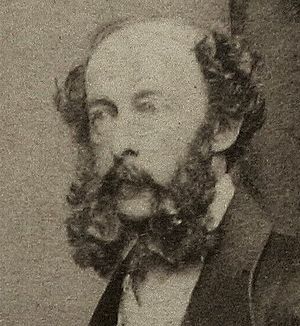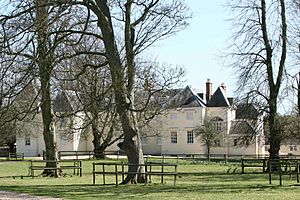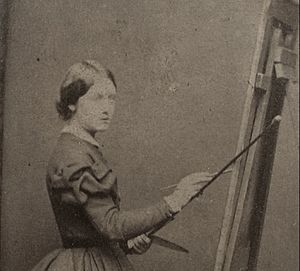Alfred Tippinge facts for kids
Quick facts for kids
Alfred Tippinge
|
|
|---|---|

Alfred Tippinge, circa 1861
|
|
| Born | 2 May 1817 |
| Died | 2 August 1898 (aged 81) Andover, Hampshire, England
|
| Nationality | British |
| Occupation | Lieutenant Colonel, Grenadier Guards |
| Known for | Drawings, paintings and letters witnessing the Crimean War at first hand |
| Spouse(s) | Flora Louisa Calvert |
Lieutenant-Colonel Alfred Tippinge (born May 2, 1817 – died August 2, 1898) was a brave British Army officer. He was a Grenadier Guards officer. He fought with great courage in the Crimean War of 1854. He took part in important battles like Alma, Balaclava, Sebastopol, and Inkerman.
At the Battle of Inkerman, he was badly hurt. He was left for dead for a whole day before being rescued. He received many awards for his bravery. These included the Crimea Medal and the Legion of Honour. People called him "one of the bravest men in action ever known." Today, Tippinge is remembered for his amazing drawings, paintings, and letters. These show what life was like for British soldiers during the Crimean War.
Tippinge married a talented artist and musician named Flora Louisa Calvert. They had three daughters. They lived in a house called Longparish House in Longparish, Hampshire.
Contents
Life of Alfred Tippinge
Alfred Tippinge was born in Wilmslow on May 2, 1817. He passed away in Andover on August 2, 1898. He was the fourth son of Thomas Tipping and Anna Hibbert. Alfred and his brothers went to Shrewsbury School. After that, he studied at the Sandhurst military academy. He later became a Justice of the Peace for Buckinghamshire. Alfred Tippinge is buried in Longparish Cemetery in Hampshire.
Flora Louisa Calvert: Artist and Musician
Alfred Tippinge married Flora Louisa Calvert on October 2, 1861. She was born in Marylebone in 1839 or Italy in 1842. Flora was a very talented artist who used watercolors. She was also a skilled musician. She could sing and play different instruments.
Flora used her talents to help others. She often performed for charity events. She was also the organist at Tufton Church. People praised her for improving the church's organ. She even added a new sound to it.
Flora helped her local village a lot. In 1893, she paid for a new reading room in Longparish. This was a place where people could read and learn. Flora Tippinge lived until she was 96 years old. She passed away in Cowes in 1935.
Alfred Tippinge's Family
Alfred and Flora Tippinge had three daughters. Their names were Isabel Flora Augusta, Violet Cecil Mary, and Helena Augusta Essex Veronica. Helena later married Arthur Irwin Dasent. Alfred Tippinge also had a nephew named Leicester Francis Gartside Tippinge. He was an officer in the Royal Navy.
Alfred Tippinge's Military Career
After finishing at Sandhurst, Alfred Tippinge joined the army. He became an ensign in the 68th regiment in 1838. He steadily moved up in rank. He became a lieutenant in 1843 and a captain in 1847. In 1854, he became a brevet major. Then, he joined the famous Grenadier Guards.
He became a captain and lieutenant colonel in 1858. He was known for his bravery in the Crimean War. He fought in four major battles: Alma, Balaclava, Sebastopol, and Inkerman. At Inkerman, he was severely wounded. He was left on the battlefield for 24 hours before being found and saved.
After the war, he received several important awards. These included the Crimea Medal with four clasps. He also received the Legion of Honour from France. The Hampshire Advertiser newspaper called him an "Inkerman hero." They said he was "one of the bravest men in action ever known." Tippinge left the army in 1858.
Letters from the Crimean War
Alfred Tippinge was not just a soldier; he was also an artist. He drew many scenes from the Crimean War in 1854. He also wrote detailed letters home. These letters tell us about the historical events. They also show us what kind of person Tippinge was.
When the Grenadier Guards left London for the Crimea, Tippinge wrote about it. He said they paraded very early in the dark. People cheered them on. The streets were full of crowds waving goodbye. He wondered how many of them would return.
The journey to Malta was rough. Tippinge wrote that the wind was strong and the sea was heavy. He was one of the few who didn't get seasick.
When they reached Scutari, the army faced new challenges. They had trouble handling pack animals like mules. Tippinge explained how hard it was to pack everything needed for war. Soldiers had to carry their own food, tents, and cooking gear. He said they ate the same food as the soldiers: bread and meat cooked over sticks.
The army arrived at Varna, Bulgaria in June 1854. The camping conditions were wet and unhealthy. Tippinge reported problems with supplies. The drivers hired to carry supplies left because they weren't paid. The soldiers also had no food or pay. Despite this, they had to build fortifications in very hot weather.
There was a terrible fire in Varna. It destroyed half the town and many army supplies. Tippinge described the chaos. Soldiers broke into spirit stores. Some even died from the fire. He also wrote about how brave the 50th regiment was. They saved the gunpowder magazine from burning down.
Life in camp was tough. Tippinge wrote about wet tents and clothes sticking to their skin. He described the rush to pack up camp quickly. Sometimes, soldiers were caught half-dressed when the tents were suddenly taken down.
The mood changed when the soldiers knew they were going to fight. Tippinge wrote about embarking for the Crimea. He felt excited about the "splendid thing to see." He hoped the war would end soon. He described the huge fleet of ships. It was a very powerful force. He expected to see the enemy soon.
Images for kids
-
Crimean War. Celebration of the Queen's Birthday, Guards Camp, 1854, by Tippinge
-
Grenadier Guards leaving the Tower prior to embarking on foreign service, 1854, by Tippinge
-
Captain Alfred Tippinge being carried wounded from the Inkerman battlefield, 1854, by Tippinge
 | Sharif Bey |
 | Hale Woodruff |
 | Richmond Barthé |
 | Purvis Young |






